Every spring we see a spike in enquiries about, and claims against, Japanese knotweed policies, and this year has been no exception, proving that it still presents a real issue for homebuyers.
Product articles
Below you’ll find articles or communications we’ve issued which are related to our Environmental indemnities.
Everyone enjoys seeing the first signs of spring, but the growing season also causes less welcome plant life to wake up. And as sure as summer follows spring, the problem of Japanese knotweed reappears every year.
The contribution made by renewables to UK power has more than doubled since 2014, with energy generated by wind, solar, biomass and hydro sources making up 42% of the UK’s electricity in 2020.
We are pleased to announce that we are extending the periods of cover on several of our policies, as borrowers increasingly ask for longer mortgage terms, and to continue to offer best cover and value for money.
Japanese Knotweed has been the subject of almost as much debate as Brexit recently, but while the jury is still out on exactly how destructive this pervasive weed can be, there’s no doubt that it is still proving a serious problem for house buyers.
Our Japanese knotweed indemnity policy can save your clients a lot of heartache, as well as protecting them financially.
The ruling in Powys v Price raises the worrying risk that more innocent property owners will be lumbered with the costs of cleaning up land contaminated by a third party.
The speed with which Japanese knotweed can overrun a property can't be overstated. That's why we need to move quickly when we receive notification of a claim against our Japanese knotweed indemnity policy.
The dreaded Japanese knotweed is notorious for causing physical damage to property, but the stigma surrounding the destructive plant is also strong enough to cause financial damage to properties too.
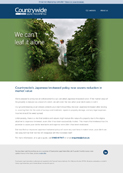
We’re pleased to announce an enhancement to our unrivalled Japanese knotweed cover: if the market value of the property is reduced as a result of a claim, we will cover the loss when your client seeks to sell it.
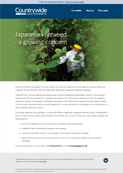
Spring is the blooming season for many plants, and most are welcomed for the additional colours they bring. However, it’s also the time when the notoriously destructive Japanese knotweed reappears.
When we were preparing to launch our Japanese knotweed indemnity policy, despite how high profile the issue has become recently, we wondered what interest there would be in the product.
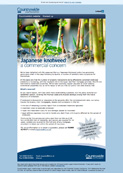
We’ve been delighted with the response that our Japanese Knotweed policy has generated, particularly when in the days following its launch, a number of solicitors took out policies for themselves.
We are delighted to announce the launch of our new Japanese Knotweed indemnity policy, which will offer protection to buyers and lenders in the event that knotweed is discovered at a property.
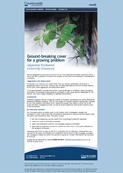
We are delighted to announce the launch of our new Japanese Knotweed indemnity policy, which will offer protection to buyers and lenders in the event that knotweed is discovered at a property.
Contaminated land has long been a concern for home buyers. When discovered at a property, it can involve crippling costs if clean-up is required and could lead to a significant loss in the property's value.
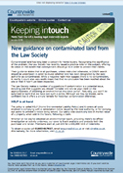
Contaminated land has long been a concern for home buyers. Recognising the significance of the problem, the Law Society has recently issued a practice note on the subject, offering its views on the extent that conveyancers should go to in order to protect their clients.
The funding for the contaminated land enforcement regime ended this year on 1st April. Although a small amount of Government money will still be available for ongoing remediation projects or for ‘absolute emergency cases' until 1 April 2017, the bad news for residents living on or near to contaminated sites is that they may now be asked to foot the bill for any clean-up.
For several years now, councils have been investigating sites for potential contamination, and if it is unearthed, the financial implications can be severe and far-reaching.
The contaminated land regime, introduced by the Environmental Protection Act, is now in its 13th year, and it's certainly debatable whether it has ever delivered the desired outcome.

It’s true – you don’t actually need an environmental report to obtain Countrywide’s Home Environmental Liability Policy (HELP).
But whether or not you’ve got a report, and providing there’s no official investigation or activity currently underway, insurance is freely available and protects both purchaser and lender.
We recently made some significant changes to our residential contaminated land policy, and we're pleased to tell you that the changes have now also been applied to our equivalent commercial cover.
